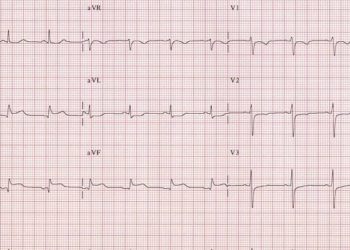Aflibercept monotherapy equivalent to bevacizumab first for diabetic macular edema
1. In patients with diabetic macular edema, aflibercept monotherapy showed no difference in vision improvement compared to step therapy of bevacizumab first followed by a switch to aflibercept.
2. Serious adverse events were more common in aflibercept monotherapy group.
Evidence Rating Level: 1 (Excellent)
Study Rundown: Diabetic macular edema is a leading cause of vision loss. Standard of care for this condition includes intravitreous anti-vascular endothelial growth factor (anti-VEGF) agents. Aflibercept is Food and Drug Administration-approved specifically for diabetic macular edema. However, bevacizumab is a lower-cost anti-VEGF agent which can be used off-label for this indication. While aflibercept has been shown to be more effective than bevacizumab, its superiority to a step therapy of bevacizumab first followed by a switch to aflibercept if required has not been previously evaluated. The present study was a multicenter, randomized trial to compare these two regimens in patients with moderate vision loss due to macular edema. At two years, 70% of the eyes under step-therapy were switched to aflibercept. There was no difference between aflibercept monotherapy and step-therapy in the improvement of visual acuity and retinal findings. Serious adverse events and hospitalizations were more common in the aflibercept monotherapy group. Although the generalizability of the study results is limited in that Asians, Native Americans, and Alaska Natives were underrepresented.
Click here to read the study in NEJM
Relevant Reading: Aflibercept, Bevacizumab, or Ranibizumab for Diabetic Macular Edema
In-Depth [randomized controlled trial]: The current study was a multicenter, randomized, controlled trial conducted at 54 sites across the United States to compare aflibercept monotherapy and bevacizumab first step therapy. Adult patients were included if they had type one or two diabetes, at least one eye with a best-corrected Electronic Early Treatment Diabetic Retinopathy Study visual acuity letter score of 24 to 69, and centrally involved diabetic macular edema on ophthalmoscopy. Eyes treated with anti-VEGF therapy for diabetic macular edema in the preceding 12 months or any treatment for diabetic macular edema in the preceding four months were excluded. A total of 270 patients were randomized 1:1 to receive 2mg intravitreous aflibercept monotherapy or 1.25mg intravitreous bevacizumab followed by a switch to 2mg aflibercept if the treated eye showed an unsatisfactory response. The primary outcome was visual-acuity letter score change over 104 weeks. Overall, the mean improvement in visual acuity was 15.0 letters in the aflibercept-monotherapy group and 14.0 letters in the bevacizumab-first group (Adjusted Difference, 0.8 letters; 95% Confidence Interval [CI], -.0.9 to 2.5; p=0.37). Retinal findings were also similar between the groups. At 104 days, 70% of the eyes in the step therapy group switched from bevacizumab to aflibercept therapy. Endophthalmitis occurred in one eye treated with aflibercept monotherapy. Systemic serious adverse events (52% of patients on aflibercept monotherapy; 36% of patients on bevacizumab first therapy) and hospitalizations (in 48% and 32%, respectively) were more prevalent among patients on aflibercept monotherapy. Overall, aflibercept monotherapy did not provide superior improvements in macular edema patients over bevacizumab first therapy.
Image: PD
©2022 2 Minute Medicine, Inc. All rights reserved. No works may be reproduced without expressed written consent from 2 Minute Medicine, Inc. Inquire about licensing here. No article should be construed as medical advice and is not intended as such by the authors or by 2 Minute Medicine, Inc.









